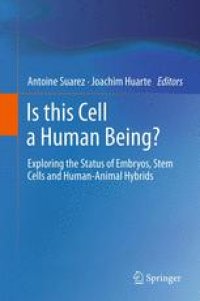
Ebook: Is this Cell a Human Being?: Exploring the Status of Embryos, Stem Cells and Human-Animal Hybrids
- Tags: Human Genetics, Theory of Medicine/Bioethics, Stem Cells, Embryology, Philosophy of Medicine, Medical Law
- Year: 2011
- Publisher: Springer-Verlag Berlin Heidelberg
- Edition: 1
- Language: English
- pdf
The central question of this book is whether or not particular cell entities of human origin ought to be considered human beings. The answer is crucial for making moral decisions for or against research and experimentation. Experts in the field discuss the production of embryonic-like pluripotent stem cells by altered nuclear transfer, parthenogenesis and reprogramming of adult somatic cells. They thoroughly analyse the biological and moral status of different cell entities, such as human stem cells, embryos and human-animal hybrid embryos, and make a decisive step towards establishing final criteria for what constitutes a human being. The topic is challenging in nature and of broad interest to all those concerned with current bioethical thought on embryonic human life and its implications for society.
The central question of this book is whether or not particular cell entities of human origin ought to be considered human beings. The answer is crucial for making moral decisions for or against research and experimentation. Experts in the field discuss the production of embryonic-like pluripotent stem cells by altered nuclear transfer, parthenogenesis and reprogramming of adult somatic cells. They thoroughly analyse the biological and moral status of different cell entities, such as human stem cells, embryos and human-animal hybrid embryos, and make a decisive step towards establishing final criteria for what constitutes a human being. The topic is challenging in nature and of broad interest to all those concerned with current bioethical thought on embryonic human life and its implications for society.
The central question of this book is whether or not particular cell entities of human origin ought to be considered human beings. The answer is crucial for making moral decisions for or against research and experimentation. Experts in the field discuss the production of embryonic-like pluripotent stem cells by altered nuclear transfer, parthenogenesis and reprogramming of adult somatic cells. They thoroughly analyse the biological and moral status of different cell entities, such as human stem cells, embryos and human-animal hybrid embryos, and make a decisive step towards establishing final criteria for what constitutes a human being. The topic is challenging in nature and of broad interest to all those concerned with current bioethical thought on embryonic human life and its implications for society.
Content:
Front Matter....Pages i-x
Introduction....Pages 1-6
Breakthrough in Stem Cell Research? The Reprogramming of Somatic Cells to Pluripotent Stem Cells: Overview and Outlook....Pages 7-24
Preimplantation Stages of Human Development: The Biological and Moral Status of Early Embryos....Pages 25-43
Complete Moles and Parthenotes Are Not Organisms....Pages 45-54
Embryos Grown in Culture Deserve the Same Moral Status as Embryos After Implantation....Pages 55-75
Distinguishing Embryos from Non-embryos....Pages 77-95
On the Status of Human Embryos and Cellular Entities Produced Through ANT: Are They Persons?....Pages 97-115
Does a Human Being Have a Right to Life? The Debate on Embryo Research in Germany as a Case Study....Pages 117-128
Interspecies Mixtures and the Status of Humanity....Pages 129-155
The Boundaries of Humanity: The Ethics of Human–Animal Chimeras in Cloning and Stem Cell Research....Pages 157-170
Is this Cell Entity a Human Being? Neural Activity, Spiritual Soul, and the Status of the Inner Cell Mass and Pluripotent Stem Cells....Pages 171-192
Back Matter....Pages 193-209
The central question of this book is whether or not particular cell entities of human origin ought to be considered human beings. The answer is crucial for making moral decisions for or against research and experimentation. Experts in the field discuss the production of embryonic-like pluripotent stem cells by altered nuclear transfer, parthenogenesis and reprogramming of adult somatic cells. They thoroughly analyse the biological and moral status of different cell entities, such as human stem cells, embryos and human-animal hybrid embryos, and make a decisive step towards establishing final criteria for what constitutes a human being. The topic is challenging in nature and of broad interest to all those concerned with current bioethical thought on embryonic human life and its implications for society.
Content:
Front Matter....Pages i-x
Introduction....Pages 1-6
Breakthrough in Stem Cell Research? The Reprogramming of Somatic Cells to Pluripotent Stem Cells: Overview and Outlook....Pages 7-24
Preimplantation Stages of Human Development: The Biological and Moral Status of Early Embryos....Pages 25-43
Complete Moles and Parthenotes Are Not Organisms....Pages 45-54
Embryos Grown in Culture Deserve the Same Moral Status as Embryos After Implantation....Pages 55-75
Distinguishing Embryos from Non-embryos....Pages 77-95
On the Status of Human Embryos and Cellular Entities Produced Through ANT: Are They Persons?....Pages 97-115
Does a Human Being Have a Right to Life? The Debate on Embryo Research in Germany as a Case Study....Pages 117-128
Interspecies Mixtures and the Status of Humanity....Pages 129-155
The Boundaries of Humanity: The Ethics of Human–Animal Chimeras in Cloning and Stem Cell Research....Pages 157-170
Is this Cell Entity a Human Being? Neural Activity, Spiritual Soul, and the Status of the Inner Cell Mass and Pluripotent Stem Cells....Pages 171-192
Back Matter....Pages 193-209
....